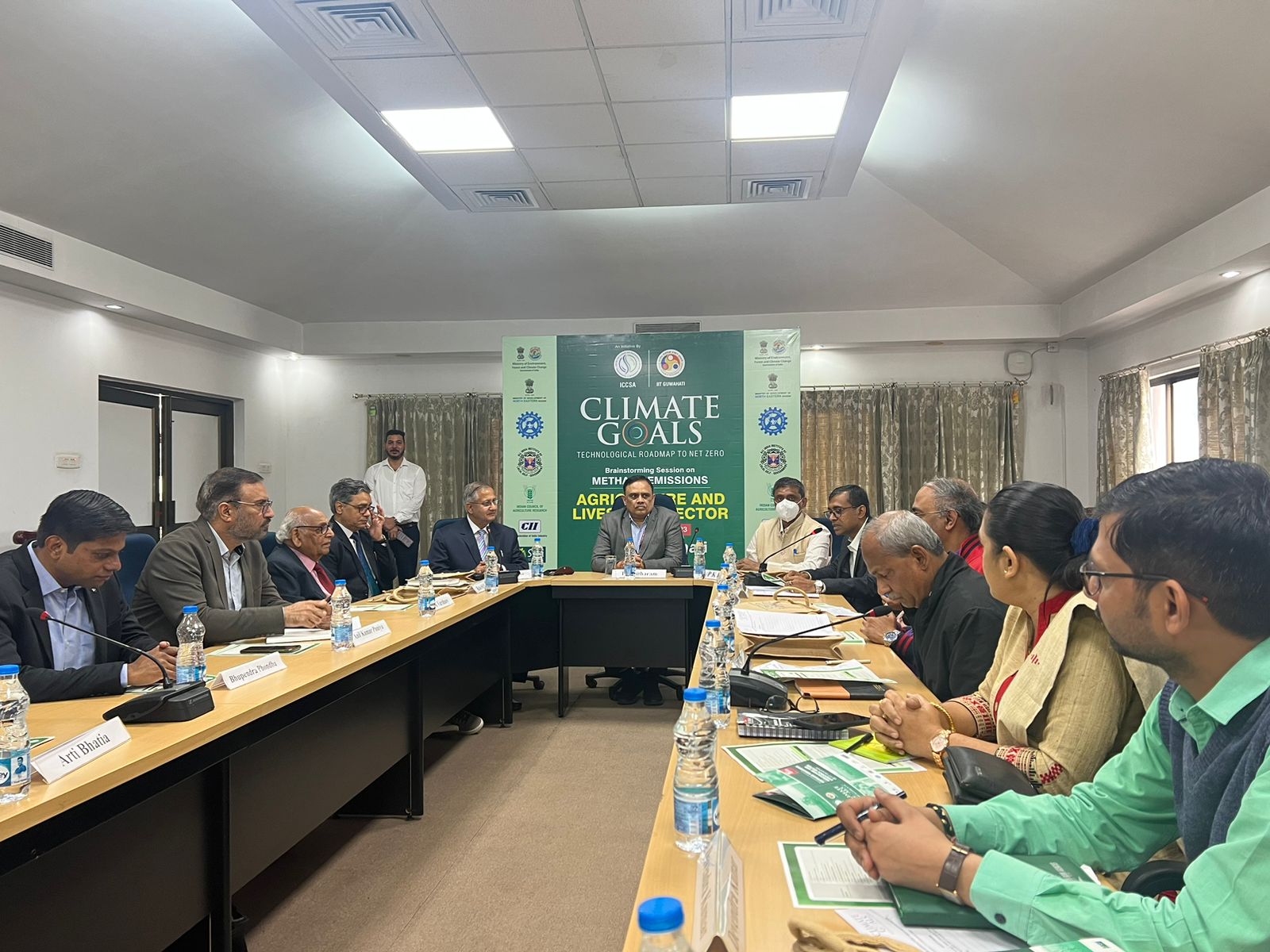Even as the nation is working towards reducing carbon footprints by investing heavily in clean energy generation sources, top scientists from prestigious institutions across the country today discussed low cost workable solutions to control and reduce methane emissions in the environment. The experts had gathered at a brainstorming session of Agriculture and Livestock of ‘Climate Goals- Technological Roadmap to Net Zero’ at IIT-Guwahati today, which was organised by International Centre for Climate and Sustainability Action Foundation (ICCSA).
Speaking on the gravity of the issue, Dr J S Sharma Head ICCSA said, “India is the third largest emitter of methane, behind China and the United States. According to the Global Methane Assessment report by the United Nations, our methane emissions in 2020 were approximately 36 million metric tons of CO2 equivalent. Which means India’s contribution to global methane emissions is about 6 percent. The emissions from the agriculture sector accounted for about 60 percent.”
Dr Sharma said, while the country is investing in creating clean energy generation infrastructure, the country should deploy a regulatory framework to check methane emission while exploring low cost workable solutions to control methane emissions. There is a need to bring in mainstream mitigation policies to achieve the goal of Paris Agreement that is vital for a limit of 1.5 degree Celsius.
Speaking on the issue the chief guest of the session, Chairman AICTE Dr T G Sitharam said that India has the highest livestock population in the world and most of the livestock managed in and around village, we must seriously consider village planning where village people can be educated on waste management, sustainable water development and livestock feed and upkeep. It will play a crucial role in achievement of India’s Net Zero goals.
Agricultural activities such as rice cultivation and livestock farming are major sources of methane emissions in India. Methane is a far more potent greenhouse gas than carbon dioxide, and it has a pronounced effect within first two decades of its presence in the atmosphere, he added.
Dr Rakesh Kumar Officer on Special Duty at CSIR Headquarters said we believe local sources that are rich in minerals, and vitamins if mixed in cattle feed will not only control methane emission but also improve milk productivity and thereby increase the income of dairy farmers.
Ration balancing/ nutrient optimisation is one of the promising strategies for reducing enteric methane emission and improving sustainability of dairying in smallholder systems. Idea of organising workshops like this in sectors such as Oil & Gas, Transportation, Waste management, Mining, and Agriculture & Livestock, to bring scientists, experts and researchers together to develop and adopt workable solutions with localised inputs, Dr Kumar said adding.
With India’s Presidency of G20 where sustainability is one of the key subject that is relevant to al the stakeholders across the world, this congregation of experts will bring necessary expertise to address the climate goals.
Summit co-chair and Head CDMR, IIT Guwahati, Dr Sudip Mitra, said, “With India setting tight deadlines for climate change goals, methane reduction becomes crucial. Climate smart and regenerative agriculture could be an efficient way to address the issue of methane emission from agriculture. Active research partnership with farmers to address the issue of methane emission management from agriculture sector is the need of the hour.”
Experts including Dr P K Iyer, officiating director IIT Guwahati, Dr Rajbir Singh Director ICAR-ATARI, Dr C K Varshney Advisor ICCSA and former Prof and Dean JNU, Dr Biswapati Mandal, Former Pro-Vice Chancellor at Bidhan Chandra Krishi Vishwavidhalaya, Dr Anil Kumar Puniya Principal Scientist and Head Dairy Microbial Division, ICAR-NDRI, Dr Arti Bhatia Principal Scientist ICAR-Indian Agricultural Research Institute, Dr Samarendra Hazarika Principal Scientist & HOD (Acting) ICAR Research Complex for NEH Region, among others discussed that some of the processes can also work at concentrations of methane lower than other methods can address, even small fractions of 1 percent, which most methods cannot remove, and does so in air rather than pure oxygen, a major advantage for real-world deployment.
The event was attended by senior scientists from Council of Scientific and Industrial Research, Indian Council of Agricultural Research, IIT Guwahati, All India Council for Technical Education, Benaras Hindu University, Ashoka Trust for Research in Ecology and the Environment, National Dairy Development Board, besides others. The experts also discussed ways and means to reduce methane emissions and also eliminate methane from the environment through collaboration.





















